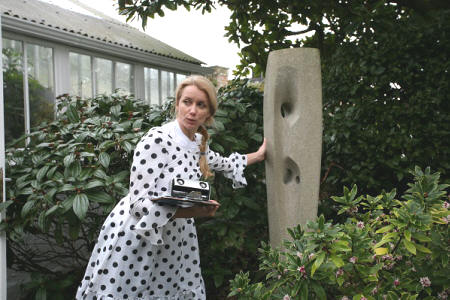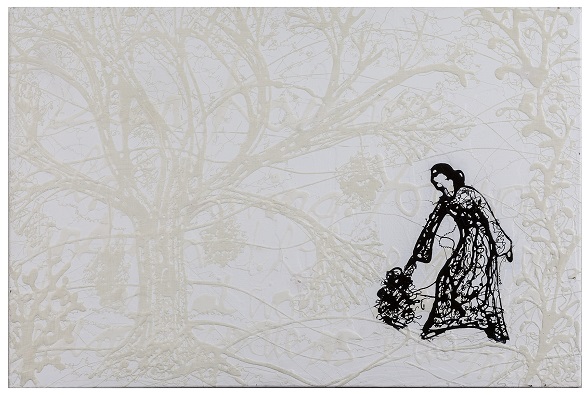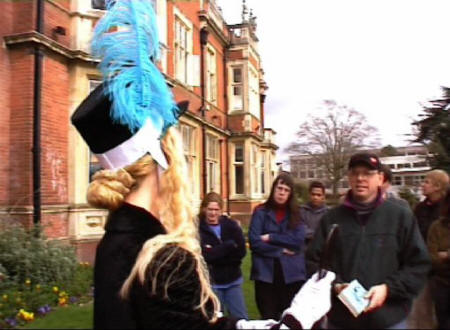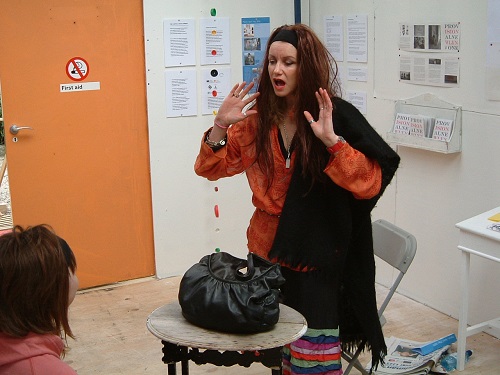|
|
| home | exhibitions | interviews | features | profiles | webprojects | archive |
|
Delpha Hudson on art, performance and 'looking back' "Re-vision - the act of looking back, of seeing
with fresh eyes, of entering an old text from a new critical direction -
is for woman far more than a chapter in cultural history, it is an act
of survival."
MM: It seems it was painful not only in respect of your experiences but also at the way you approached them at the time. Would you say that returning to those times has allowed you a different view of things? DH: A lot of my work is about the breakdown I had in my thirties when my children were small. Looking back, I can see that motherhood informed and changed my life entirely, in wonderful ways but also in ways that still make me angry. The whole process of remembering was cathartic and quite healing and it reasserted my interest in trying to convey women's lived realities in art and to represent women's lives, especially mothers who are often invisible or represented in stereotypical ways. MM: Working on 'Theatre of Self' and during the process of the writing of 'Acts of Survival', what do you think you have learnt about your practice, yourself, your experience? DH: The main strands of realisation from taking that time out to reflect were that we are whoever we think we are, and that's often many different people living multiple lives, and the stories we tell ourselves constantly can be changed. That's something I've dealt with a lot in my work in terms of use of the body and performance - one of things I found looking back was realising how hard I had to work to make art-work, being a single working mother and an artist in Cornwall - I am amazed that I persevered in making work whilst caring for my children and doing paid work to make ends meet. Looking back was about accepting that role and the choices I made - even though I felt frustrated that I couldn't go off travelling around the world making art as many of my live-art peers did. I feel quite proud that I made work and made it differently. MM: Would you say it's all about perspective? DH: It's part of it. It brought me back to my early work in the early noughties where I was using many sorts of media, including video, performance and installation, to make time-based work focusing on the passage of time and the way in which we perceive feminine subjectivity, through a combination of media - which would include the past, the present and, maybe theoretically, the future.
DH: Yes, and it's lovely that the writing project and the 'Theatre of Self' have brought me back to very much wanting to re-engage in previous works - not to re-enact them but rather to recombine elements of work that I have completed in the past. In a similar way to performance artist Joan Jonas, who has purposefully created new work that takes components from her earlier pieces, using them in different juxtapositions over time and in different sites and not as re-enactment. Looking back helped me realise that many of my previous works are very much enmeshed in continued concerns about representing motherhood. 'Miss Readings at the Tate' (picture above) wasn't just about tour guiding in a meta-historical sense but also about examining Barbara Hepworth's experience of mothering and how she coped being both artist and mother. MM: Is this a revival of your engagement with ideas that have been simmering underneath in some way? DH: Many artists can lose their way and feel
they've changed their practice, I do like that idea about things
simmering underneath because ultimately most of us stick to a kind of a
recurrent bestiary; a set of themes and metaphors, that we use to
constantly move and create dialogue with what has gone before, rather
than repetition. Some of my previous performance practice strayed into
the theatrical and at times a sense of spectacle but I always took
elements from performances and reworked them into a different time and
place, like 'Double Void', where I dragged
a sack of lard corresponding to the weight of a child. I never
considered it a repeatable piece - it was re-worked, re-versioned and
re-sited, in a different time and place. 'Double Burden' was a
performance made
MM: Has this re-visiting in every sense influenced your studio practice? DH: Yes, very definitely. It has made me look at the ways I manipulate materials in all aspects of my work. I have come to realise that painting and sculpture are performances, especially when using bitumen as a painting medium. It's never the same; whatever I drip on to the canvas can never be replicated. Although, I do make groups of works like 'Domestic Dystopias' which I'm making at the moment, which are quite large paintings that have small children, or putti, a sort of winged cupid, but depicted here creating scenes of domestic chaos in a quasi-humorous way. Paintings use similar ideas but are unrepeatable acts. Bitumen is a gestural medium and its not going to last. It will eventually rot the canvas so the paintings have their own built-in obsolescence. There are many lines of enquiry and parallels with performance and studio practice. There are lovely ways in which I see performance theory and 'Theatre of Self' reflecting what I do in the studio. The same threads are running through all of it. MM: Would you say your use of theoretical ideas has the same relevance today? DH: It's been good to look at my theoretical moorings. I use reading as a springboard for my work, and its quite eclectic. I like grazing and browsing. You have helped me a great deal in the writing project about my arts practice, which you in fact titled 'Acts of Survival' to focus and return to a few main sources including Adrienne Rich, Mary Kelly, Hal Foster, Elizabeth Grosz, Julie Kristeva, Luce, Irigaray, Christine Battersby and Gilles Deleuze, as their ideas have accumulated different meanings over time. Battersby and Deleuze are the ones I come back to. DH: I especially like the way Christine Battersby uses metaphysical arguments for fluid, gendered selfhood, making it possible for women to exist as a Subject and move and represent themselves differently, and this for me has possible links to a re-reading of Deleuze's concept of multiplicity. MM: Do you think viewers of your work need an understanding of the theoretical language that informs it? DH: It's a tricky area for artists when you don't want to just illustrate a theory, you want to find visually engaging ways of making it meaningful. Artists create new languages and if audiences take away one small iota of a notion, then some of the ideas embedded in the work have successfully come through. MM: Coming full circle, thinking about the retrospective nature of this project, how do you think your work resonates in today's world? DH: There's a lot of renewed interest in the work of older women artists. Despite more equal trends in parenting it's obvious not enough has changed for women and mothers because if it had there would not be so many young women artists who are making work about motherhood, often using performance which is more popular as a medium now than it was in the late '90s. Feminist performance is absolutely relevant and necessary. What I've done and will carry on doing, is promoting theory and methods of working that I hope are inspiring. When I wrote my MA dissertation about motherhood and performance in 2002, it was really hard to find and reference other performances about motherhood with the exception of Bobby Baker. I'm glad that's changing. MM: And finally, what are your plans for the future? DH: In looking back at my performance practice, I'd like to do more - in the same vein as before. Performance can take many forms and be combined in surprising ways. Work would still be incidental and unscripted - sometimes just as conversations in the street. I've got a terrible memory and I'm not a performer so a lot of my work has often been about the slippage between characters, 'the self', and the person I'm trying to be; a tour guide, Jane Austen (picture above), or a failed palm reader who reads handbags (below). They were meant to be funny and make us think about the fluidity and malleability of gendered selves.
MM: Would this involve you collaborating with others as you have done in the past? DH: Yes, possibly. I'd also love to do more work with my partner Nigel Bispham. He is a wonderful composer and performer and when we have time it would be great to develop some more sound installation and performance projects in the future, we haven't done anything since 2016 when we went to Venice to perform Place Settings.
MM: That
is something that I really look forward to. Thank you Delpha; it has
been a pleasure to work with you and to talk to you today.
websites: instagram: delpha_hudson
|
|
|



 last
year in a London gallery, where I used similar motifs but in a
completely different way. 'Theatre of Self' is also a project which
isn't finalisable but has the potential to constantly evolve.
last
year in a London gallery, where I used similar motifs but in a
completely different way. 'Theatre of Self' is also a project which
isn't finalisable but has the potential to constantly evolve.
 I'd
like to use more humour -its very clear that the way to reach people and
encourage them to think differently about things is to make them laugh.
It does something that nothing else can. I can be far too serious.
Theatre of the Self is a very serious project but I hope I can still
incorporate some humour.
I'd
like to use more humour -its very clear that the way to reach people and
encourage them to think differently about things is to make them laugh.
It does something that nothing else can. I can be far too serious.
Theatre of the Self is a very serious project but I hope I can still
incorporate some humour.